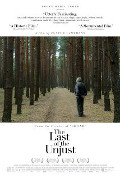
France 2013
Directed by
Claude Lanzmann
220 minutes
Rated M
Reviewed by
Bernard Hemingway

Last Of The Unjust, The
Synopsis: An extended interview between veteran film-maker Claude Lanzmann and Rabbi Benjamin Murmelstein, the last leader of the Jewish Council at the Nazi camp, Theresienstadt, a Nazi "model ghetto".
Writer-director Claude Lanzmann is best known for Shoah, a 1985 nine-and-a-half hour documentary on the Holocaust that drew together a wide range of first-hand survivor accounts. Since then he has continued to explore the mind-boggling horror in subsequent documentaries. Here he focuses on one man, Benjamin Murmelstein, a prominent rabbi in Vienna who became the last Jewish elder of the Theresienstadt ghetto, 37 miles from Prague, a propaganda exercise designed to show concerned international visitors the humanity of the Nazi’s "resettlement" of Jews
Murmelstein was the only survivor of a group of three Jewish Elders who helped the Nazis, and Adolf Eichmann in particular, run Theresienstadt and who after the war was accused of collaboration but acquitted. The Last of the Unjust is largely an extended interview that Lanzmann held with Murmelstein in Rome in 1975, interspersed with the director’s own present-day reflections.
Whilst the subject matter is of interest as a first-hand account of Nazi praxis, the frustration of the film as such is that we only ever hear Murmelstein’s testimony and despite his apparent candour, cannot help but feel that his well-rehearsed account conveniently omits much that is less-than-flattering to him. Lanzmann appears happy to accept the learned rabbi’s account but some countervailing points of view would have helped to make this film a more sustaining experience
Aside from the opportunity to reflect on the general moral issue of how oneself would act in a similar situation, possibly the most interesting material is Murmelstein’s account of Eichmann, who, quite contrary to Hannah Arendt’s famous view about the “banality of evil”, recently aired in the film that takes her name, he describes as a sadistic madman.
Murmelstein's description of his being caught "between the hammer and the anvil" sounds convincing but only he himself will ever know what he had to do to escape the bullet that killed his two Council colleagues, not to mention the fate of the multitude who died in the concentration camps of Birkenau and Auschwitz.
His situation presents a compelling moral dilemma but whether one needs to spend nearly four hours listening to Murmelstein dispassionately justify his actions (and at times showing an rather bizarre satisfaction in the quality of his work as a Nazi apparatchik) is another matter.

Want more about this film?


Want something different?




